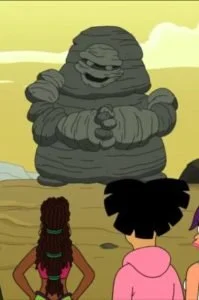Tropes to Avoid When Writing Agender Characters
Welcome back to Queering the Narrative! Last week we went over the broad strokes for writing agender characters. To follow up on that topic, this week we’re going to get into some tropes that you should avoid (or at least approach with caution) when writing agender characters!
Inhumanity
We’ve talked about this one before, but it bears repeating because agender robots/aliens/etc is a BIG trope that isn’t necessarily, you know, kind.
Many folx consider gender to be so essential to their humanity that the quickest way to make something seem inhuman is to make it non-gendered. Sometimes this comes up as third-gender or otherwise non-binary gender, but most often it comes through as a character with no gender, and how supposedly strange that lack of gender is
I’ll say it again, because it’s important: agender people are people. Their gender identity, or lack thereof, is just as valid, important, and deserving of respect as anyone else’s. To imply — either textually or subtextually — that there is something inherently inhuman about them is rude.
This isn’t to say that your inhuman character HAS to have a gender — just don’t make their lack of gender what defines their inhumanity, and include a very much human agender person alongside them for good measure!
Emotionless
Similar to the above, a lot of people connect gender to the emotions one is allowed/able to experience. Therefore, such folx might reason, someone without a gender would feel no emotion!
This is dumb. Emotions are not tied to gender, and agender folx are capable of experiencing the full range of emotions. To imply otherwise is unkind, and can be harmful to young agender folx who are still coming to terms with their identities.
A sub-category to this is to make agender folx sexless/asexual. Agender people do have sex organs and can experience sexual attraction. That doesn’t mean all agender folx are allosexual, of course -- asexual agender people exist. But that is not an inherent part of being agender.
Neurodivergence
In a lot of fiction involving agender folx, the agender individual is also portrayed as somehow neurodivergent, such as being on the autism spectrum (or vice versa). This is not inherently harmful, and doesn’t necessarily need to be avoided, just handled mindfully
Neurodiverse folx can and do have genders, and not everyone who is agender is neurodiverse. To imply that one inherently goes along with the other is reductive toward both identities, and erases the very valid and legitimate experiences of a whole host of people!
Casual Erasure
This one’s not as common, but sometimes a character’s gender is simply never mentioned. This allows creators to imply some gender mystery, or for folx to headcannon them as whatever form of non-binary that they want. This, however, only works for folx begging for table scraps of representation — and we all deserve authentic, respectful, fully canon representation in our media! If you’d like to make a mysteriously un-gendered character, by all means do it — but acknowledging they don’t HAVE a gender, or at least don’t really care about their gender, would be a pretty cool thing and add some awesome agender characters to our collective canon!
(Not to mention the fact that if a cool character’s gender is left ambiguous, they’re automatically assumed to be male until proven otherwise in a shocking twist so… yeah)
There’s a similar thing that happens here when people of non-Western cultures are portrayed in fiction -- because such a character is not immediately identified as man/woman to our Western minds, they get lumped into a non-gendered role, when really they might just be embodying a particular gender role/identity for their culture. When writing agender characters, be careful that you don’t confuse a gender you don’t understand for a lack of gender. Do your research!
Cavalerity
People writing agender characters often really lean into the idea that agender folx just don’t care about gender. Agender characters are written as cavalier regarding gender, embodying the idea that someone without a gender just doesn’t really care about anything — which can come across as either a super punk genderfuck sort of expression, or a character mired in apathy.
While some agender folx might feel that way about their gender, many care deeply about how their gender is perceived. They don’t want to be confused for being cisgender, and don’t want people to just forget their gender identity. They want to be seen and understood by those around them
When writing agender characters, be careful to make sure that you aren’t treating their identity flippantly. If someone identifies as agender, they probably put quite a lot of thought into that! And, even if someone doesn’t care about how their gender is perceived, they care about how they are perceived. They very likely just want to be known and understood for something other than their gender!
Conclusion
That’s it for this week! You might notice some similarities between these tropes and the ones for non-binary or genderfluid folx, and there’s definitely some overlap, but there are specific considerations to bear in mind when writing agender characters.
I’ll be back next week to talk about introducing agender characters, but until then stay safe, stay healthy, and keep writing!

